

Tao Te Ching
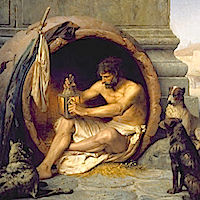
Diogenes at home with his honest-man-looking lamp Jean-Léon Gérôme
Cynicism (κυνισμός) Lineage
Wisdom Lineage Tree – Cynicism (κυνισμός)
A “back-to-nature” school of Ancient Greek and Roman philosophy, the term Cynicism is a misnomer (which means 'dog-like') applied and distorted by critics. The Cynic school actually taught how to discover the purpose of life by living in virtuous simplicity and in harmony with nature. Like the Taoist and Buddhist teachings, it rejected desire, ambition and all striving for wealth, power, pleasure, and fame. It spread with the rise of Imperial Rome, strongly influenced early Christianity, and disappeared as a separate tradition in the late 5th century. However, the deep Cynic emphasis on wisdom, compassion, and goodness continued and remains a strong but underused influence today.
People (10)
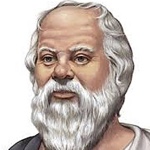
Socrates
469 – 399 BCE
One of the most powerful influences on Western Civilization
A founder of Western philosophy, Socrates’ immense influence, methods and insight challenged conventions and encouraged a simple way of life. His lineage continued through Plato, Aristotle, Alexander the Great and some of his other students began important schools of philosophy like Cynicism and Stoicism. Famous for developing the Socratic Method still used today and which could be considered a way of moving from understanding the words to understanding the sense; Socrates became a profound influence on the Roman empire, medieval Europe, the Islamic and Judaic Middle East, the Renaissance and the Age of Reason in Europe. Through more modern philosophers like Locke, Hobbes, and Voltaire; Socrates stays with us today.
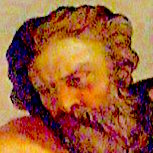
Antisthenes
445 – 365 BCE
Creator of a religious tradition without religion
Founder of the “Cynic” philosophy (named after the place he taught, Dogfish), student of Socrates and with him when he died, plagiarized by Plato, and teacher to Diogenes who made his teachings famous creating a “religious order without religion;” Antisthenes taught that the wise follow the sense and not the words, virtue instead of laws, insight instead of memes. Criticizing belief in universals, he questioned taking fame, fortune, pleasure and power as life priorities and modeled the value of a simple life in harmony with nature setting the stage for the early Christian ascetics. Dressing in the most common and worn clothes, he refused any pay for his teachings and preferred poor students.
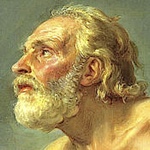
Diogenes (of Sinope)
412 – 323 BCE
Exiled from his place of birth, Diogenes lived as a citizen of the world begging for food and sleeping in a big ceramic jar. Carrying a lamp during the day “looking for an honest man,” he publicly ridiculed Alexander the Great, sabotaged and embarrassed Plato, and was sold into slavery after being captured by pirates. He developed Cynicism and teachings that became Stoicism, one of the most influential philosophies of Greek culture. He criticized the artificialities of society and advocated simplicity and a return to nature. Referencing him in their works, he inspired many great literary figures including Chekhov, Blake, Goethe, Dostoevsky, Cervantes, Charlotte Brontë and Charles Dickens. Called by Plato ”Socrates gone mad,” his poetic spirit and lifestyle continued through the ages, manifested in modern times by people like Charles Bukowski, and embodied in stories like Jack Kerouac’s On the Road.
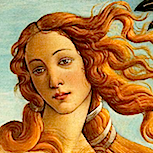
Phryne
371 - c.310 BCE
Model for the most famous sculptor of the time, Praxiteles and the first life-size statue of the nude female form; Phryne’s habit of letting down her hair and swimming naked in the sea during Elusion festivals inspired Apelles’ famous painting of Aphrodite as well as Botticelli's famous Birth of Venus. Her success as a hetaira courtesan made her so rich she was said to offer funding to rebuild the walls of Thebes destroyed by Alexander the Great if the words "Destroyed by Alexander, restored by Phryne the courtesan" were inscribed on them. Apparently too much to ask, this led to a charge of “impiety” at a trial where she was vindicated and found not guilty after baring her breasts.
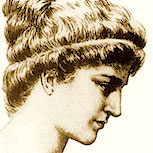
Hipparchia ππαρχία (of Maroneia)
350 – 280 BCE
Cynic philosopher and the only women on Diogenes Laërtius' list of eminent philosophers, Hipparchia influenced Zeno's views on love and sex, on the founding of Stoicism. She fell in love with her teacher, the most famous Cynic of the time, Crates; and going against her parents, married him to live a street-life of poverty. Going far beyond what was considered acceptable for women, she wore men’s clothes and living on equal terms with her husband became a symbol for rejecting conventional values and thinking for yourself. Rejecting the conventional roles for women in favor of philosophy, she left her rich family, became a beggar, consummated her relationship with Crates in public, and with him epitomized unwavering fidelity and deep affection.
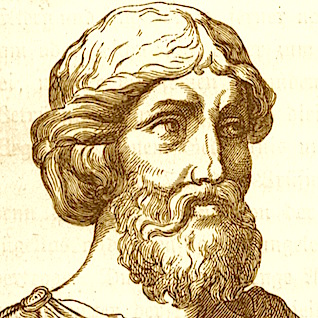
Epicurus ɛpɪˈkjɔːrəs
341 – 270 BCE
Western Buddha
Author of 300 lost books, a huge influence on western philosophy through Schopenhauer, Nietzsche, Karl Marx, David Hume, and inspiration for Thomas Jefferson’s “all men are created equal and endowed with certain unalienable rights, such as life, liberty, and the pursuit of happiness;” Epicurus blended the wisdom of pleasure with the pleasure of wisdom (Durant) and fostered equality and freedom welcoming into his school without prejudice slaves, different races, women, and courtesans. “Unsurpassably kind” to everyone, with many parallels to Lao Tzu, Epicurus taught that the purpose of philosophy is to free us from fear and suffering, to guide us to happiness.
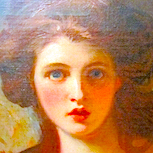
Leontium Λεόντιον (Leontion)
fl. 300 BCE
Philosopher, courtesan and mistress to Epicurus; Leontium had a child with him, helped develop his Epicurean philosophy, and wrote several books. Praised by Epicurus for the clarity of her philosophy and writings, she encouraged his policy of letting women and slaves attend his classes, and was a scandal to philosophers like Leontium and Pliny for - as a woman and prostitute - writing an erudite and devastating criticism of famous philosophers like Theophrastus. Barely mentioned in history and mainly by Epicurean critics who blamed her for her influence on ideas they disagreed with, Leontium helped create a more open and happy world.
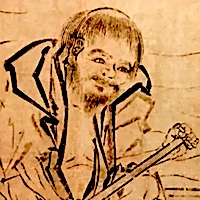
Huating Decheng 華亭德誠
820 – 858 CE
After intense study with Chan Master Yaoshan Weiyan, Decheng moved to Hua Ting and lived on a small boat. He semi-anonymously stayed in the background and passed as a very ordinary person. As an occupation, he took people across a river while—with discrete subtlety—teaching them his Chan Buddhist understanding. In a famous story, he triggered a student's enlightenment by pushing him off the boat into the river. After the students realization, Dechenbg told him not to think about him anymore and fell off the boat into the water liberating the student from the golden chains of hero-worshipping delusion.
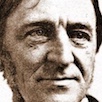
Ralph Waldo Emerson
1803 – 1882 CE
Champion of individualism
Friend and mentor to Henry David Thoreau and godfather to William James, Emerson championed individualism as a counterbalance to society’s conformist pressures. He wrote what Oliver Wendell Holmes considered America's “Intellectual Declaration of Independence” and he summarized his philosophy as “the infinitude of the private man.” The most influential writer of 19th-century America, he was called “the Concord Sage” and became the leading voice of intellectual culture in the United States influencing American religions to become more gnostic, less fundamentalist and conservative.
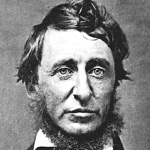
Henry David Thoreau
1817 – 1862 CE
Father of environmentalism and America's first yogi
Dedicated abolitionist, "America's first yogi," champion of nature and the natural, “father of environmentalism;” Thoreau brought a little Lao Tzu into 19th Century America. Instead of following in the pattern of his piers leading a life of “quiet desperation,” Thoreau followed much more in the Tao Te Ching’s style of Wu Wei. His non-violent approach to opposing slavery and the Mexican-American War inspired future leaders like Gandhi and Martin Luther King. Although one of America's most famous writers, during his lifetime his most famous book, Walden didn’t sell enough copies to pay for the paper it was printed on.
Related Sources (1 sources)
Quotes about the Cynicism Lineage (2 quotes)

“The Cynics despised worldly goods, and showed their contempt by eschewing the comforts of civilization; this is the same point of view that led Socrates to go barefoot and ill-clad.”
Comments: Click to comment
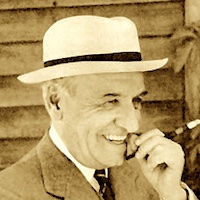
“The cynic, a parasite of civilization, lives by denying it, for the very reason that he is convinced that it will not fail. What would become of the cynic among a savage people where everyone, naturally and quite seriously, fulfills what the cynic farcically considers to be his personal role?”
Comments: Click to comment
Comments (0)